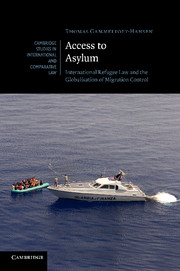Book contents
- Frontmatter
- Contents
- Foreword
- Preface
- Acknowledgements
- Table of treaties and other international instruments
- Table of cases
- 1 Introduction
- 2 The refugee and the globalisation of migration control
- 3 Refugee protection and the reach of the non-refoulement principle
- 4 Offshore migration control and the concept of extraterritorial jurisdiction
- 5 The privatisation of migration control and state responsibility
- 6 ‘Hic abundant leones’: the institutional reach of refugee protection
- 7 Conclusion
- Bibliography
- Index
- CAMBRIDGE STUDIES IN INTERNATIONAL AND COMPARATIVE LAW
Foreword
Published online by Cambridge University Press: 03 May 2011
- Frontmatter
- Contents
- Foreword
- Preface
- Acknowledgements
- Table of treaties and other international instruments
- Table of cases
- 1 Introduction
- 2 The refugee and the globalisation of migration control
- 3 Refugee protection and the reach of the non-refoulement principle
- 4 Offshore migration control and the concept of extraterritorial jurisdiction
- 5 The privatisation of migration control and state responsibility
- 6 ‘Hic abundant leones’: the institutional reach of refugee protection
- 7 Conclusion
- Bibliography
- Index
- CAMBRIDGE STUDIES IN INTERNATIONAL AND COMPARATIVE LAW
Summary
Most refugees today cannot travel to the developed world to seek recognition of their international legal right to protection. They instead face an ever-expanding array of mechanisms – carrier sanctions, border security systems, migration management regimes and the like – which seek to deflect them from wealthy states. This dilemma has been exacerbated in recent years by the rapid expansion of governmental efforts to contract out many migration management functions to transport companies, security firms and other non-state actors. Refugees may thus never be able to reach the territory of a country which has in principle agreed to receive them; they may never be in a position to state their claim to a person with the legal responsibility and authority to protect them; or both.
Distancing himself from those who proclaim a ‘legal black hole’ when refugees are encountered in extraterritorial settings, Thomas Gammeltoft-Hansen effectively shows that refugee law's core norm of non-refoulement is among a small number of vital rights that must be respected wherever a state exercises jurisdiction. And drawing on both principles of state responsibility and the duty of due diligence, he shows also that states cannot blithely invoke the traditional maxim that they bear no liability for private acts as a means of disavowing liability for deterrence effected by the non-state actors refugees are most likely to encounter.
But this book is no simplistic manifesto for refugee rights. To the contrary, Gammeltoft-Hansen forthrightly identifies and explores the critical areas of legal ambiguity – what is jurisdiction?
- Type
- Chapter
- Information
- Access to AsylumInternational Refugee Law and the Globalisation of Migration Control, pp. ix - xPublisher: Cambridge University PressPrint publication year: 2011



